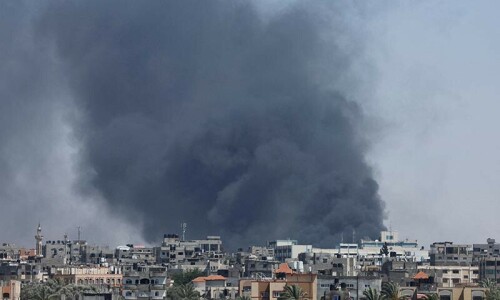ADDIS ABABA: South Sudan's government and rebels on Thursday signed a ceasefire agreement, pledging to halt fighting within 24 hours and end five weeks of bitter conflict that has left thousands dead.
The agreement was signed in the Ethiopian capital Addis Ababa by representatives of South Sudan's President Salva Kiir and rebel delegates loyal to ousted vice president Riek Machar, and was greeted by cheers from regional peace brokers and diplomats.
Mediators from the East African regional bloc IGAD, which has been brokering the peace talks, said the deal will put in place a verification and monitoring mechanism for the truce and allow unrestricted access to aid workers.
South Sudan's government also agreed to free 11 officials close to Machar who were detained after fighting between rival army units broke out on December 15, although no timeline for their release was given. The status of the detainees had been a major sticking point in the talks.
The fighting has been marked by atrocities committed by both sides, and more than half a million people have been forced from their homes amid a wave of ethnic violence in the already impoverished nation. Aid workers and analysts believe up to 10,000 people have died.
“These two agreements are the ingredients to create an environment for achieving a total peace in my country,” said Taban Deng, head of the rebel delegation.
He said he hoped the deal would “pave the way for a serious national political dialogue aiming at reaching a lasting peace in South Sudan,” the world's newest nation which only won independence from Khartoum in 2011.
Government negotiator Nhial Deng Nhial said the talks, which have been dragging on in a luxury hotel for three weeks, were “not easy”.
“We hope to be able to make haste towards an agreement that will end bloodshed,” he said, but voiced scepticism over the ability of the rebels, comprised of renegade army units, ethnic militia and ordinary civilians, to halt their operations.
“What worries us is whether the agreement on the cessation of hostilities will stick (and) the capacity of the rebel group... to stop fighting,” he added.
“We would like to take this opportunity to urge the rebel group to heed the voice of reason and abandon the quest for political power through violence.”
US welcomes 'critical first step'
The United States, which played a crucial role in helping South Sudan win independence, welcomed the deal as a “critical first step” and called on both parties to implement it swiftly.
“This is a first critical step in ending the violence... we expect both parties to fully and swiftly implement the agreement,” said White House spokesman Jay Carney, urging the two sides to move toward “an inclusive political dialogue”.
He also said that “those who have committed atrocities must be held accountable”.
After initial clashes broke out in the capital Juba more than a month ago, the conflict rapidly escalated into all-out war between the regular army, who have been backed by Ugandan troops, and breakaway army units and other militia.
The violence took on an ethnic dimension as members of Kiir's Dinka tribe clashed with Machar's Nuer group, sending thousands to seek shelter in squalid camps or within UN peacekeeping bases.
On Monday government forces recaptured the town of Malakal situated in the strategic oil-producing Upper Nile state and the last major settlement under rebel control. Large numbers of rebel forces, however, are still massed in rural areas and smaller towns.
Malakal, the town of Bentiu in oil-producing Unity State and Jonglei State capital Bor have all been largely destroyed and emptied after weeks of sometimes intense combat.
Jan Egeland, a former United Nations aid chief and now head of the Norwegian Refugee Council (NRC), on Thursday described the scale of the atrocities and war crimes, including the recruitment of child soldiers -- as being as bad as those seen in Syria or Somalia.
“We're very, very concerned that there's more and more killings along ethnic lines,” Egeland told AFP.
“The gruesome slaughtering of defenceless civilians is as bad as in Syria, in Somalia, as elsewhere. The whole point here is that it can be avoided, it should be avoided, it must be avoided.”
The United Nations has said it is investigating widespread reports of atrocities and war crimes, including massacres, gang rapes and summary executions.
British aid agency Oxfam said the country now had a “second chance” and urged both side to allow respect the pledge to allow full humanitarian access.
“The demand in the agreement for humanitarian access is a clear acknowledgement that the dire living conditions for the near half a million people displaced by recent violence are unacceptable and must be reversed,” said Jose Barahona, Oxfam's County Director for South Sudan.













































Dear visitor, the comments section is undergoing an overhaul and will return soon.